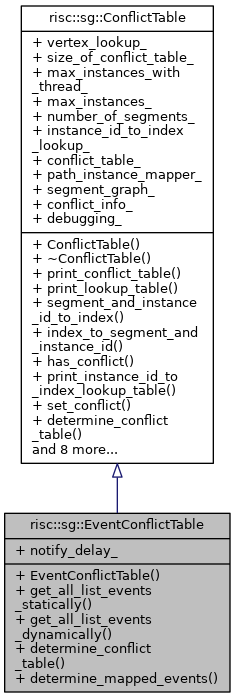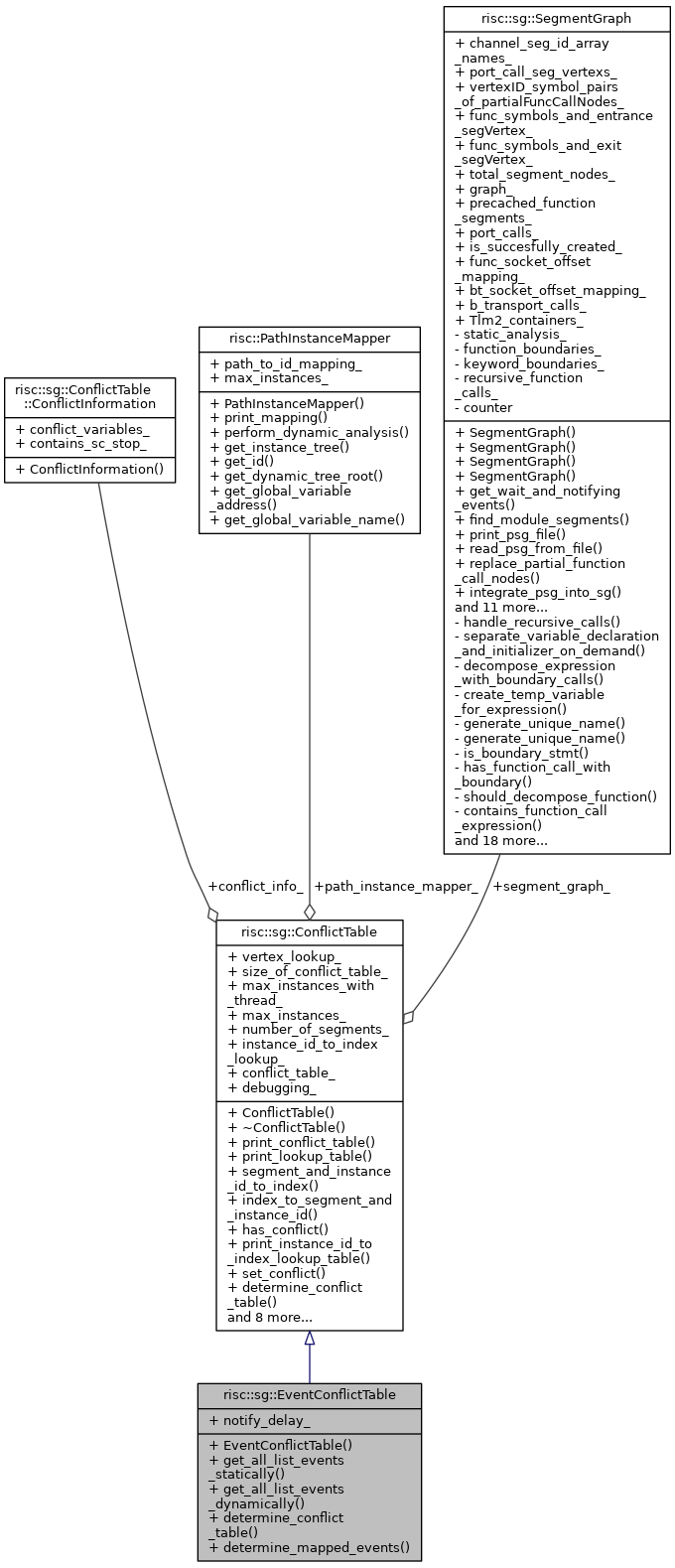The conflicts are stored in the base class variable conflict_table_. The columns represent wait statements of the segments. The rows are representing the notifications of events. So, a true in conflict_table_[i][j] means that the associated segment/instance i notifies the event for which the associated segment/instance j is waiting. More...
#include <event_conflict_table.h>


Public Member Functions | |
| EventConflictTable (SegmentGraph &graph, PathInstanceMapper *path_instance_mapper, bool debugging) | |
| Default constructor for the DataConflictTable. More... | |
| std::list < risc::sg::MappedVariable > | get_all_list_events_statically (SgSymbol *sc_event_list, int instance_id, PortCallPath pcp) |
| This function determines all the registered events in the event list statically. More... | |
| std::list < risc::sg::MappedVariable > | get_all_list_events_dynamically (SgVariableSymbol *sc_event_list, int instance_id) |
| This function determines all the registered events in the event list dynamically. More... | |
| virtual void | determine_conflict_table () |
| This function determines conflicts among the segments. More... | |
| std::list < risc::sg::MappedVariable > | determine_mapped_events (std::set< SymbolWithPath > &event_list, int instance_id, bool dynamic_analysis) |
| This function determines the mapping of events (RD, 07/13/18) More... | |
| void | print_conflict_table (std::string filename) |
| Generates a html file of the conflict table. More... | |
| void | print_lookup_table (std::string filename) |
| Generates a html file of the lookup table. More... | |
| int | segment_and_instance_id_to_index (int segment_id, int instance_id) |
| This function translates a given segment id and instance id to a index of the conflict table. More... | |
| std::pair< int, int > | index_to_segment_and_instance_id (int index) |
| This function translates a given index from the conflict table into the corresponding segment id and instance id. The first value is the segment id and the second value is the instance id. More... | |
| bool | has_conflict (int segment_id_1, int instance_id_1, int segment_id_2, int instance_id_2) |
| This function looks up if there is a conflict between segment 1 with instance id 1 and segment 2 with instance id 2. More... | |
| void | print_instance_id_to_index_lookup_table () |
| This function prints the table instance_id_to_index_lookup_table in the terminal. More... | |
| void | set_conflict (int segment_id_1, int instance_id_1, int segment_id_2, int instance_id_2) |
| This function sets a conflict in the conflict table. More... | |
| VertexDescriptor | segment_id_to_vertex_descriptor (int id) |
| This function translates the given segment id to the corresponding vertex descriptor. More... | |
| MappedVariableList | get_mapped_variable (SgVariableSymbol *variable, int instance_id, bool dynamic_analysis) |
| Determines the mapped variable. More... | |
| MappedVariableList | get_mapped_variable_statically (SgVariableSymbol *variable, int instance_id) |
| This function determines for a given variable the mapped variable. If variable is a reference, the mapped variable will be looked up. Otherwise, the original symbol and instance id is returned. More... | |
| MappedVariableList | get_mapped_variable_dynamically (SgVariableSymbol *variable, int instance_id) |
| This function determines the mapped address of a reference during the pre simulation. More... | |
| int | get_max_instances (int segment_id) |
| This functions returns how many instances of a given segment exist. More... | |
| int | get_channel_id (const SymbolWithPath &swp, int instance, bool dynamic_analysis) |
| Determines the channel instance id for a given variable declared in a channel. More... | |
| int | get_channel_id_statically (const SymbolWithPath &swp, int instance) |
| Determines the channel instance id for a given variable declared in a channel. More... | |
| int | get_channel_id_dynamically (const SymbolWithPath &swp, int instance) |
| Determines the channel instance id for a given variable declared in a channel. More... | |
Public Attributes | |
| std::unordered_map< int, std::unordered_map< int, Time > > | notify_delay_ |
| added to support immediate notification and notify with time More... | |
| VertexDescriptor * | vertex_lookup_ |
| This lookup table translates segment ids into vertex descriptors. At position i is the segment with the id of instance_id_to_index_lookup_[0][i]. More... | |
| int | size_of_conflict_table_ |
| This variable defines the size of the conflict table. The size is quadratic. More... | |
| int | max_instances_with_thread_ |
| Maximum number of module/channel instances Only instances with at least one simulation thread are considered. More... | |
| int | max_instances_ |
| This variable represents the max number of module instances in the design. Also, this is the number of rows in the instance_id_to_index_lookup_ table. More... | |
| int | number_of_segments_ |
| This variable defines how many segments exist in the segment graph. Also, this is the number of columns in the instance_id_to_index_lookup_ table. More... | |
| int ** | instance_id_to_index_lookup_ |
| This table should be used a lookup table: (segment id, instance id) -> index of conflict table. More... | |
| bool ** | conflict_table_ |
| The conflict table. More... | |
| PathInstanceMapper * | path_instance_mapper_ |
| SegmentGraph & | segment_graph_ |
| ConflictInformation ** | conflict_info_ |
| bool | debugging_ |
The conflicts are stored in the base class variable conflict_table_. The columns represent wait statements of the segments. The rows are representing the notifications of events. So, a true in conflict_table_[i][j] means that the associated segment/instance i notifies the event for which the associated segment/instance j is waiting.
TODO Handling for pointers
| risc::sg::EventConflictTable::EventConflictTable | ( | SegmentGraph & | graph, |
| PathInstanceMapper * | path_instance_mapper, | ||
| bool | debugging | ||
| ) |
Default constructor for the DataConflictTable.
|
virtual |
This function determines conflicts among the segments.
Reimplemented from risc::sg::ConflictTable.
| risc::sg::EventConflictTable::determine_mapped_events | ( | std::set< SymbolWithPath > & | event_list, |
| int | instance_id, | ||
| bool | dynamic_analysis | ||
| ) |
This function determines the mapping of events (RD, 07/13/18)
| risc::sg::EventConflictTable::get_all_list_events_dynamically | ( | SgVariableSymbol * | sc_event_list, |
| int | instance_id | ||
| ) |
This function determines all the registered events in the event list dynamically.
| risc::sg::EventConflictTable::get_all_list_events_statically | ( | SgSymbol * | sc_event_list, |
| int | instance_id, | ||
| PortCallPath | pcp | ||
| ) |
This function determines all the registered events in the event list statically.
|
inherited |
Determines the channel instance id for a given variable declared in a channel.
| swp | Symbol with the associated port call path |
| instance | instance id of the hosting module |
| dynamic_analysis | if the analysis is dynamic_analysis |
|
inherited |
Determines the channel instance id for a given variable declared in a channel.
| swp | Symbol with the associated port call path |
| instance | instance id of the hosting module |
|
inherited |
Determines the channel instance id for a given variable declared in a channel.
| swp | Symbol with the associated port call path |
| instance | instance id of the hosting module |
|
inherited |
Determines the mapped variable.
|
inherited |
This function determines the mapped address of a reference during the pre simulation.
|
inherited |
This function determines for a given variable the mapped variable. If variable is a reference, the mapped variable will be looked up. Otherwise, the original symbol and instance id is returned.
|
inherited |
This functions returns how many instances of a given segment exist.
|
inherited |
This function looks up if there is a conflict between segment 1 with instance id 1 and segment 2 with instance id 2.
|
inherited |
This function translates a given index from the conflict table into the corresponding segment id and instance id. The first value is the segment id and the second value is the instance id.
|
inherited |
Generates a html file of the conflict table.
|
inherited |
This function prints the table instance_id_to_index_lookup_table in the terminal.
|
inherited |
Generates a html file of the lookup table.
|
inherited |
This function translates a given segment id and instance id to a index of the conflict table.
|
inherited |
This function translates the given segment id to the corresponding vertex descriptor.
|
inherited |
This function sets a conflict in the conflict table.
|
inherited |
|
inherited |
The conflict table.
|
inherited |
|
inherited |
This table should be used a lookup table: (segment id, instance id) -> index of conflict table.
|
inherited |
This variable represents the max number of module instances in the design. Also, this is the number of rows in the instance_id_to_index_lookup_ table.
|
inherited |
Maximum number of module/channel instances Only instances with at least one simulation thread are considered.
| std::unordered_map<int, std::unordered_map<int, Time> > risc::sg::EventConflictTable::notify_delay_ |
added to support immediate notification and notify with time
|
inherited |
This variable defines how many segments exist in the segment graph. Also, this is the number of columns in the instance_id_to_index_lookup_ table.
|
inherited |
|
inherited |
|
inherited |
This variable defines the size of the conflict table. The size is quadratic.
|
inherited |
This lookup table translates segment ids into vertex descriptors. At position i is the segment with the id of instance_id_to_index_lookup_[0][i].
 1.8.5
1.8.5